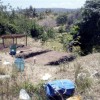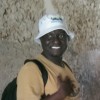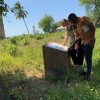This post is written by Patricia Hart, who directs our partner ArchaeoLink. Here she details exciting new plans to return to Pangani and continue the brilliant work with the schools she made contact with in 2018.
******************************************************
AUTHOR: Patricia Hart, Project Director.
We are delighted to report that funds have now been obtained for ArchaeoLink* to proceed with phase 2 of the History Houses project in Pangani, Tanzania, where archaeologists from York, Cambridge and Dar Es Salaam universities are working with seven schools and the Uzikwasa Heritage Centre to foster awareness of the area’s rich history and endangered heritage.
Pangani was a major port on the eastern coast of Tanzania when trading, particularly of ivory and slaves, flourished in the 19th century. Palatial buildings from that period are similar to those in Stone Town, Zanzibar, but are becoming dilapidated through lack of resources for their care.
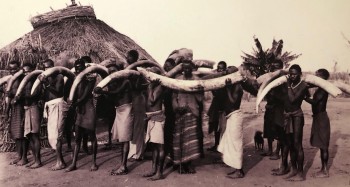
Phase 1 of the collaborative project entailed an assessment visit in July 2018 for an educational programme focussing on the archaeology, history and built heritage of Pangani. Contact was established with archaeologists from the university of Dar es Salaam, as well as government officials, NGOs and teachers in Pangani who all welcomed the idea of educational resources to highlight Pangani’s rich cultural heritage.
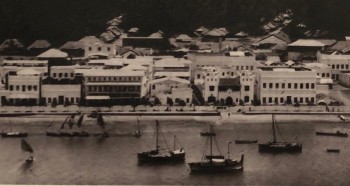
We discovered that curricula in local schools, particularly at secondary level, are quite full. Classes are larger than in the UK state sector, and most teaching is based on rote learning. As English, Civics and History lessons already make extensive use of written comprehension exercises, we agree with local teachers that the easiest way for us to boost pupil knowledge of heritage issues would be to design and provide site-specific material for the classroom that feeds into their existing schoolwork.
We also discussed the advantages of Socratic teaching i.e. the development of critical thinking skills through structured dialogue. After watching a couple of demonstrations, the teachers were keen to accept our suggestion that posters be developed to stimulate discussion, on condition that we provide the questions. While we shall do this initially, we hope they will begin to devise their own questions once we have assisted them to understand the goals and become comfortable with the material.
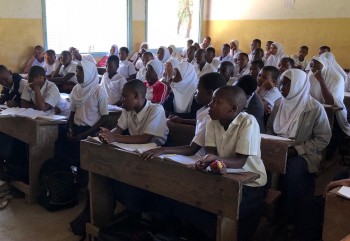
During the 2018 visit, we provided the schools with some activity sheets of puzzles and games themed on Historic Buildings, Trade and Archaeology. The feedback we received then will help us to improve our work. It is proposed that the Activity Sheets we produce will be used in schools, perhaps as “reward” exercises, and also in Uzikwasa’s Heritage Centre.
For the Heritage Centre we shall also produce a Mapping Exercise to encourage young people and perhaps adults to locate and learn more about the buildings described.
The entire project can only happen with the collaboration of many people. Currently we are obtaining information from archaeologists and historians who have worked in Pangani as a basis for producing drafts of comprehension exercises, posters and full notes for the teachers. These will then be sent to the archaeologists for review and then to the teachers for assessment and comment. From their input we hope to produce near final proofs to be sent again to Tanzania for approval or editing.
When all is approved, we will get the material laid out, printed and laminated.
In collaboration with the Education Department of the University of Dar Es Salaam, we plan to develop a capacity- building programme to ensure the teachers are familiar with the resources and comfortable in using them. To achieve maximum impact, we anticipate delivering this individually at each school. It is hoped that, for this stage, we will be accompanied by a small group of education students from the university; and we are actively looking for funding for this.
We will also be working with staff from Uzikwasa’s Heritage Centre so that they too are confident in the use of the Activity Sheets and the Mapping Exercise.
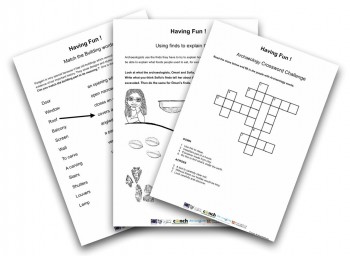
Finally, we will invite all teachers and interested parties to gather at the Heritage Centre to familiarise themselves with the exhibition there and to participate in a Walk, Talk and Sketch activity that was so popular in 2018 with the children. It is hoped that by giving this experience to the adults, they will pass it on to their children in turn.
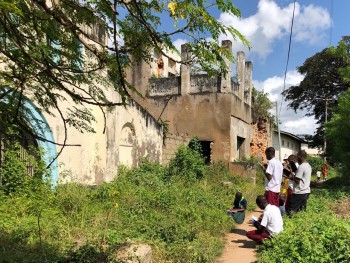
*ArchaeoLink was founded in 2012 and is a British registered charity #1183498. Our purpose is to liaise between archaeologists and the communities in which they work. We facilitate knowledge exchange and assist those communities to obtain societal, economic and educational benefits from their archaeology and cultural heritage: www.ArchaeoLink.org.

